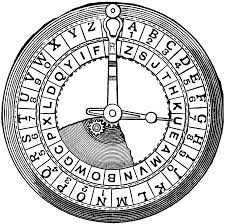记忆方法
将“cipher”与“隐”字相连,想象在古代,人们用一种秘密的、隐秘的方式(cipher)来进行通讯,这样可以帮助记住单词“cipher”与“隐写术”或“编码”有关。
以上内容由AI生成, 仅供参考和借鉴
中文词源
cipher 密码
来自阿拉伯语sifr,零,词源同zero.因为古人早期对数字零的认识不足,该词逐渐被赋予神秘 色彩,词义也由零引申为密码。
英语词源
- cipher
-
cipher: [14] The central meaning of cipher is ‘zero’ (a word to which it is related); its use since the 16th century in connection with encrypted communications derives from the fact that in their earliest forms such codes usually consisted of numbers representing letters, and cipher had by then broadened in use from ‘nought’ to ‘any numeral’. It entered English through Old French cifre, which came via medieval Latin cifra from Arabic sifr (source of English zero); this was a nominal use of an adjective meaning ‘empty’.
=> zero - cipher (n.)
- late 14c., "arithmetical symbol for zero," from Old French cifre "nought, zero," Medieval Latin cifra, with Spanish and Italian cifra, ultimately from Arabic sifr "zero," literally "empty, nothing," from safara "to be empty;" loan-translation of Sanskrit sunya-s "empty." The word came to Europe with Arabic numerals. Originally in English "zero," then "any numeral" (early 15c.), then (first in French and Italian) "secret way of writing; coded message" (a sense first attested in English 1520s), because early codes often substituted numbers for letters. Klein says Modern French chiffre is from Italian cifra.
- cipher (v.)
- "to do arithmetic" (with Arabic numerals), 1520s, from cipher (n.). Meaning "to write in code" is from 1560s. Related: Ciphered; ciphering.
权威例句
- 1. a message in cipher
- 密码信
- 2. All important plans were sent to the police in cipher.
- 所有重要计划均以密码送往警方.
- 3. It's a telegram in cipher.
- 这是密码电报.
- 4. He's a mere cipher in the company.
- 他在公司里是个无足轻重的小人物.
- 5. I couldn't cipher out his motives.
- 我猜不出他的动机.
